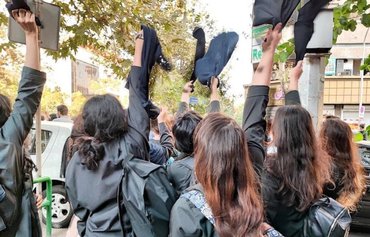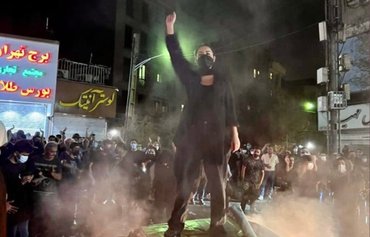In light of the widespread protests in Iran following the death of 22-year-old Mahsa Amini in custody of the "morality police", the Iranian regime temporarily ended the reign of the ultraconservative force on the streets.
Many Iranians say the country's streets, particularly in major cities, are unrecognisable as a large number of women, including most young women, leave their homes without headscarves every day.
But the regime in mid-July announced the return of the dreaded police to enforce mandatory dress code and hair coverage.
Clearly fearful of further protests, the regime is treading lightly as it gradually brings back the force to the streets.
![Popular Iranian actress Afsaneh Baygan has been banned from acting and leaving the country and sentenced to a two-year suspended prison term for removing state-mandated hair coverage. [Twitter]](/cnmi_am/images/2023/07/25/43144-Iran-Baygan-coverage-600_384.jpg)
Popular Iranian actress Afsaneh Baygan has been banned from acting and leaving the country and sentenced to a two-year suspended prison term for removing state-mandated hair coverage. [Twitter]
![Iranian actress Leila Boloukat has been banned from working, leaving the country and conducting social media activity after refusing to wear the regime-mandated hair coverage. [Twitter]](/cnmi_am/images/2023/07/25/43143-Iran-coverage-Boloukat-600_384.jpg)
Iranian actress Leila Boloukat has been banned from working, leaving the country and conducting social media activity after refusing to wear the regime-mandated hair coverage. [Twitter]
During the crackdown on protests, which centred on women's rights and freedoms and were mainly led by women, the regime's security forces killed over 500 protesters and detained some 20,000 members of the public.
The government also disrupted internet connections, social media and messaging applications, continuing the restrictions even after the protests died down earlier this year.
In several cases, officials within the regime have contradicted each other since the decision to return the morality police to the streets was announced.
As members of the force started to be seen again on some streets in late July, an unnamed Majles (Iranian parliament) member said the presence of the force would be to "solely coax the public to abide by the state's mandated dress code".
The implication was that the morality police would not use harsh methods to crack down on those whom they deem "violators".
Meanwhile, ultraconservative judiciary chief Gholam-hossein Mohseni-Eje'i has reportedly suggested appointing special judges for trying cases concerning individuals who violate the compulsory dress code.
Shifting blame
Amid widespread criticism of the decision, various sectors and figures within the regime have shifted the blame and denied having any role in the decision making.
IRGC-affiliated media, including Tasnim News, have said the decision was made by Iranian president Ebrahim Raisi, but Raisi's administration has denied this.
Vice president for Women and Family Affairs Ensieh Khazali was quoted by Iranian media as saying the decision was made by the Law Enforcement Forces (LEF), not the government.
Khazali went on to say she has "not heard such an order from the president".
But on July 20, Iranian daily Etemad daily quoted a "senior official with Iran's LEF" saying the LEF would never make a decision on its own.
The official said "the initiative to return morality police forces to the streets was launched under the direct order of the president [Raisi] as deputy Commander in Chief and director of the Superior National Security Council".
Etemad also quoted the unnamed official as saying "it is clear that the gentlemen [government officials] are throwing the ball into the LEF's court to protect themselves from potential harm".
Many analysts have suggested that Raisi and his administration have distanced themselves from the decision to enforce mandatory coverage with the election season looming.
Psychological labels
Many celebrities have continued to leave their homes with uncovered hair, participate in various ceremonies and give speeches without hair coverage.
In mid-July, famed actress Afsaneh Baygan announced she would retire from acting as she refuses to comply with the hair coverage mandate.
Azadeh Samadi and Leila Boloukat, two other well-known actresses, also have refused to follow the mandate.
These three women have been wearing hats instead of headscarves, which has been done in movies and television series without censure from the regime.
But the judiciary has issued extraordinary sentences for all three women.
All three have been banned from acting, leaving the country and conducting social media activity. Baygan also was handed a two-year suspended prison term.
The court has ordered both Baygan and Samadi to have regular counselling sessions at an official mental health centre as it said they suffer from "antisocial personality disorder".
The unprecedented sentence demonstrates the regime's desperate efforts to control the narrative, observers say.
On the heels of the counselling sessions ordered by the court, four psychological associations have issued a joint statement in critique of the order.
Among the multiple points in the statement, they noted that the court's identification of what it has described as a psychological condition is unconvincing, illogical and unscientific.
Such diagnoses should be made by psychologists, not judges, they added.
The statement also criticised using "labels" related to mental health.
Meanwhile, several male celebrities have said they stand in solidarity with their female peers amid the pushback on mandatory coverage.
Among them is Pejman Bazeghi, a popular actor and director of the Iranian Actors Association, who has spoken out in support of the actresses.
In addition to celebrities, other well-known figures have been criticising the regime's mandated head coverings.
Since the start of the recent protests, Abdolhamid Ismaeelzahi, a Sunni cleric who leads the Friday prayers in the majority-Sunni city of Zahedan, has been criticising the regime's methods of crackdown during his sermons each week.
Without fail, the government has severely disrupted internet connection in Zahedan every Friday.
One of the points Ismaeelzahi, known as Molavi Abdolhamid, has made repeatedly in his sermons is the futility of mandating hair coverings and using extreme methods to implement the mandate.

![Observers say most parts of Iran look completely different from the past four decades after women have unveiled. [Iran International]](/cnmi_am/images/2023/07/25/43133-Iran-hair-coverage-600_384.jpg)






